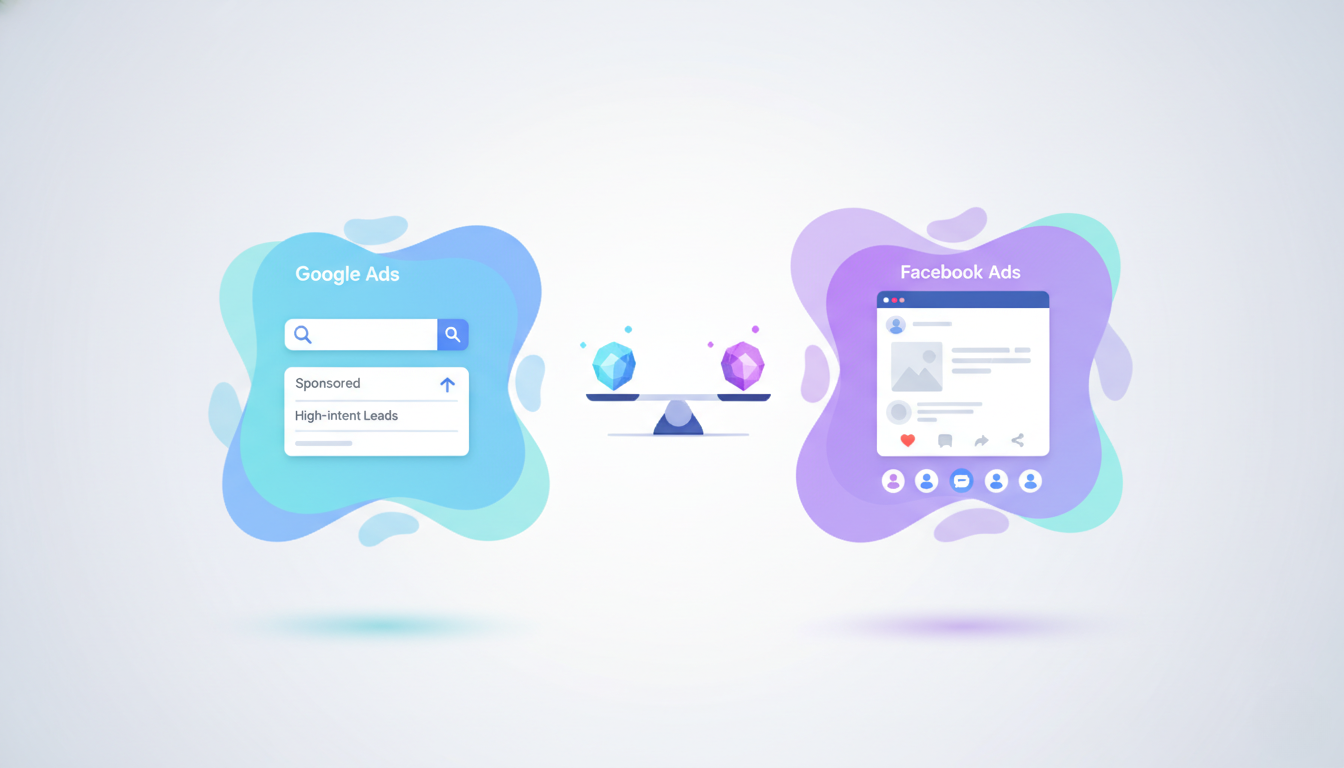Back to Blog
Google Ads
5 min read
3 views
Google Ads vs. Facebook Ads: Which Is Right for Your Business?
Google Ads and Facebook Ads both deliver powerful results, but they work very differently. This guide breaks down the strengths of each platform so you can confidently choose where to invest your marketing budget.
Sarah Zizolfo
Published on July 18, 2025

Choosing where to spend your advertising budget is one of the most important decisions you can make as a business owner. Google Ads and Facebook Ads are two of the most powerful platforms available today, but they serve completely different purposes. Understanding how each platform works will help you pick the one that brings the highest return for your business.
Below is a simple, practical comparison to help you decide which platform fits your goals, your audience, and your budget.
How Google Ads Works
Google Ads captures people at the exact moment they are searching for a solution. When someone types “plumber near me” or “best daycare in Surrey,” they’re expressing clear, immediate intent. These are motivated buyers who already know what they want.
Because of that, Google Ads tends to deliver higher-quality leads and faster conversions.
You’re essentially placing your business in front of customers who are ready to take action.
Google Ads is ideal if you want:
• High-intent traffic
• Local service calls and bookings
• Immediate demand capture
• Customers actively searching for your product or service
How Facebook Ads Works
Facebook Ads works differently. Instead of targeting people based on what they’re searching for, it targets them based on who they are — their interests, behaviors, and demographics.
This makes Facebook a powerful tool for building awareness, increasing visibility, and reaching audiences who may not be actively searching yet but could still be interested in what you offer.
Facebook Ads is ideal if you want:
• Brand exposure
• Video views and engagement
• Retargeting website visitors
• Broad audience reach
• Content promotion
• Nurturing cold audiences over time
Cost Differences
In most industries, Google Ads tends to cost more per click because you are competing for high-intent searches. But those clicks often lead to faster conversions.
Facebook Ads usually have a lower cost per click and can generate a large volume of impressions, but conversions may take more time because users aren’t actively searching.
A well-balanced strategy often uses both:
Google to capture demand,
Facebook to create demand.
Which Platform Is Right for You?
If your goal is immediate leads, calls, bookings, or purchases, Google Ads typically performs better.
If your goal is brand awareness, engagement, and top-of-funnel visibility, Facebook Ads is usually the stronger choice.
Many businesses get the best results using both platforms together. Facebook warms up the audience, Google converts them when they’re ready to buy.
The right choice depends on:
• Your industry
• Your budget
• How fast you need results
• Whether you sell a service or a product
Final Thoughts
There isn’t a “one-size-fits-all” answer. Both Google Ads and Facebook Ads are incredibly effective when used correctly. The key is understanding how each platform influences the customer journey.
If you want to reach people who are already searching for you, choose Google Ads.
If you want to reach people who need to learn about you, choose Facebook Ads.
And if you want long-term, consistent growth, consider using both.
When you pair smart targeting with great creative and proper tracking, your ads — on either platform — can become a reliable engine for business growth.
Below is a simple, practical comparison to help you decide which platform fits your goals, your audience, and your budget.
How Google Ads Works
Google Ads captures people at the exact moment they are searching for a solution. When someone types “plumber near me” or “best daycare in Surrey,” they’re expressing clear, immediate intent. These are motivated buyers who already know what they want.
Because of that, Google Ads tends to deliver higher-quality leads and faster conversions.
You’re essentially placing your business in front of customers who are ready to take action.
Google Ads is ideal if you want:
• High-intent traffic
• Local service calls and bookings
• Immediate demand capture
• Customers actively searching for your product or service
How Facebook Ads Works
Facebook Ads works differently. Instead of targeting people based on what they’re searching for, it targets them based on who they are — their interests, behaviors, and demographics.
This makes Facebook a powerful tool for building awareness, increasing visibility, and reaching audiences who may not be actively searching yet but could still be interested in what you offer.
Facebook Ads is ideal if you want:
• Brand exposure
• Video views and engagement
• Retargeting website visitors
• Broad audience reach
• Content promotion
• Nurturing cold audiences over time
Cost Differences
In most industries, Google Ads tends to cost more per click because you are competing for high-intent searches. But those clicks often lead to faster conversions.
Facebook Ads usually have a lower cost per click and can generate a large volume of impressions, but conversions may take more time because users aren’t actively searching.
A well-balanced strategy often uses both:
Google to capture demand,
Facebook to create demand.
Which Platform Is Right for You?
If your goal is immediate leads, calls, bookings, or purchases, Google Ads typically performs better.
If your goal is brand awareness, engagement, and top-of-funnel visibility, Facebook Ads is usually the stronger choice.
Many businesses get the best results using both platforms together. Facebook warms up the audience, Google converts them when they’re ready to buy.
The right choice depends on:
• Your industry
• Your budget
• How fast you need results
• Whether you sell a service or a product
Final Thoughts
There isn’t a “one-size-fits-all” answer. Both Google Ads and Facebook Ads are incredibly effective when used correctly. The key is understanding how each platform influences the customer journey.
If you want to reach people who are already searching for you, choose Google Ads.
If you want to reach people who need to learn about you, choose Facebook Ads.
And if you want long-term, consistent growth, consider using both.
When you pair smart targeting with great creative and proper tracking, your ads — on either platform — can become a reliable engine for business growth.
Tags:google adsfacebook adspaid advertisingad strategydigital marketingad comparison
Ready to grow your business?
Let's discuss how we can help you achieve your digital marketing goals.
Schedule a Free Consultation